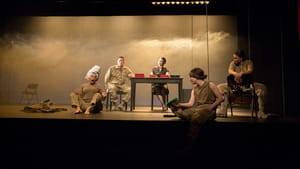Stay in the Loop
BSR publishes on a weekly schedule, with an email newsletter every Wednesday and Thursday morning. There’s no paywall, and subscribing is always free.
A wounded hero and the fierceness of his victims
'Don Juan Comes Home from Iraq' at the Wilma (3rd review)

The hero of Don Juan Comes Home from Iraq, a new play developed in a two-year collaboration between award-winning playwright Paula Vogel and the Wilma's artistic director, Blanka Zizka, is a difficult hero to like. He’s a womanizer who uses women to fulfill his own needs with little regard for theirs. We are, I think, supposed to care for him, but that’s a challenge despite the excellent performance by Keith Conallen in the title role.
The play is structured around the journey of Capt. Don Juan (Conallen), a Marine who comes home from war with PTSD and TBI (traumatic brain injury) to search for Cressida (Kate Czajkowski), his missing lover. He claims to have changed, but he’s in such pain, which he desperately self-medicates, that it’s hard to trust his promises of reform.
The setting of the play, which is both Iraq (or some stylized battlefield that could be any place people are intent on killing each other) and Philadelphia (where people are fighting their own wars against drugs and poverty and despair) are brought to life on a minimalist stage that also serves as an imagined landscape where people, places, and events long gone — like Ben Franklin and the Divine Lorraine Hotel and the attack on the MOVE house — can appear at will.
Invisible women
But the play is much more than that. The play is also about sexual relationships in wartime and sexual abuse, and by leaving out that part of the story, the women who are victimized — in the play and in real life — are also rendered invisible. Women are critical to the play as the beloved, as the betrayed, as the victims of male anger and aggression, as the holder of hetero norms and assumptions about women’s roles. Yes, they are also present as sexual partners — needing and giving comfort — and sexual creatures with their own desires. And yet, nothing I read before seeing the play prepared me for their presence.
In the play itself, the women and the men talk about women having a choice between being "hos or bitches." The women have no choice but to claim those titles with pride rather than to see themselves as victims. In many ways, war has done to the men what the men have done to the women. One of the lines that is repeated both by the men and the women is “betrayed, abandoned, lied to.” That is what has been done to all of them — by each other, by their government, by the medical system, by their faith.
Don Juan is perhaps no longer a hero for our time. The libertine, the womanizer, the man with many partners has come to be understood as more of a villain than a figure of romance. And yet there is still a fascination with the swashbuckling hero of yesteryear who can sweep women off their feet with just a wink and a smile — although this Don Juan claims his conquests more by force than by charm. A wounded veteran who has lost her legs tells Don Juan that she is organizing “an army of women veterans” who will change the system so that he and others like him will be treated "like the sex offenders that you are." It is a battle being played out in the courts today.
Both Don Juan and Water by the Spoonful by Quiara Alegría Hudes, directed by Lucie Tiberghien, which closed recently at the Arden Theatre Company, deal with the issue of returning veterans and their guilt for what happened during battle. I notice that both these powerful plays have been written and directed by women. Is there some reason for this? Is it that women are particularly affected by the wounding of their warriors? And when they can’t comfort and cure, they too fall apart like the mother who failed to save her child in Water and turned to drugs instead. Failing to save a child figures strongly, as well, in Don Juan on the battlefield and in the depiction of the MOVE house bombing. Saving a child and saving one’s soul are very much equated in both plays.
Missing veterans
The performances are strong, particularly Conallen as Don Juan, who is present on stage for almost the entire two hours and holds our attention throughout. Czajkowski as Cressida has a sweetness that seems at odds with her desire to join the army, but the other women have the brashness that one would associate with both the military and South Philly. The stage itself is a character. A giant platform tilts and dangles, offering at once battlefield, bedroom, and the vastness of the desert under a star-filled sky.
The play was developed in workshops and conversations with veterans and has a sense of authenticity, and yet there’s another group that seems invisible as well both in the play and in real life. When we think about returning vets, we think about those with injuries, both mental and physical, but according to Melissa Fitzgerald, Senior Director of Justice For Vets, who works to help returning veterans with substance abuse or mental health issues avoid unnecessary incarceration, there are those who have been made stronger as a result of service. Perhaps in our desire to do better for the veterans of Iraq and Afghanistan than we did for Vietnam vets, we have forgotten those who are not as damaged. Because the country as a whole is not affected by the war, Fitzgerald suggests, these veterans come home to a place that somehow knows it’s at war, but doesn’t really want to think about it.
In this play no one, it seems, is allowed to succeed. The romantic dies before he can propose to his girl, which would have been doomed to failure because he had already been betrayed by his friend. The men lose their minds, the women lose body parts as well as ownership of their bodies. And they all lose a sense of purpose and trust. They have all been “betrayed, abandoned, lied to.”
A display of photos and quotes in the Wilma lobby shows us what some veterans have to say about their experiences, even if we have trouble listening. Perhaps we need to find a way to heal all of us, to save the child and our own souls at the same time.
For a review by Steve Cohen, click here.
For a response by Dan Rottenberg, click here.
What, When, Where
Don Juan Comes Home from Iraq, by Paula Vogel, Blanka Zizka directed. Through April 20, 2014 at the Wilma Theater, 265 S. Broad St., Philadelphia. 215-546-7824 or www.wilmatheater.org.
Sign up for our newsletter
All of the week's new articles, all in one place. Sign up for the free weekly BSR newsletters, and don't miss a conversation.

 Naomi Orwin
Naomi Orwin